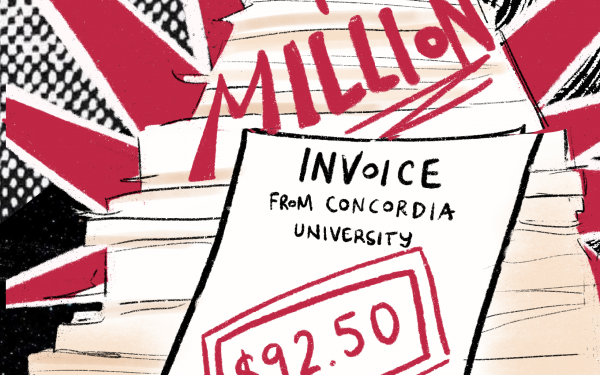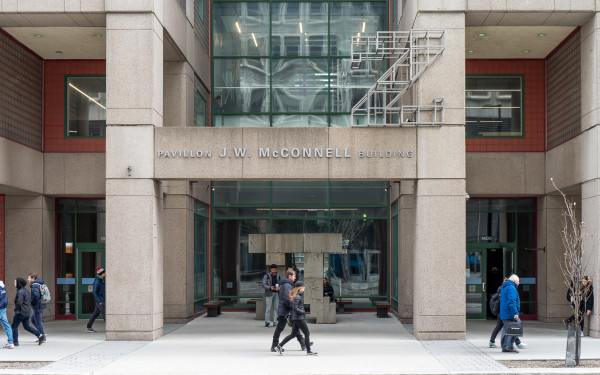Skyrocketing food prices impact Montrealers
As grocery prices continue to rise, students call for systemic change
When Liam Neary began his studies at Concordia, he expected a monthly grocery bill of around $250.
Now, having almost completed his second year, his food budget has gone up by approximately one hundred dollars—simply from buying enough to cook around three meals per week. “It’s only been going up since,” Neary said.
Like Neary, nursing student Gabrielle Axelle Elie’s Provigo trip now costs her close to $100, almost double to what it cost a few years ago.
According to a 2022 Maclean’s education report, 40 per cent of post-secondary students in Canada are food insecure, and heading into the upcoming year, inflation will continue to drive food prices higher and higher for students like him.
Canada's 2024 Food Price Report states that overall food prices are likely to increase by 2.5 to 4.5 per cent over the coming year—a slight decrease from the five to seven per cent increase the year prior. The report states that broader factors such as labour disputes, climate change and the geopolitical impact of the Russia-Ukraine war contributed to food inflation throughout 2023.
COVID-19 lockdowns have resulted in higher energy prices, which is straining the food distribution system, and is driving the price of food up, according to Statistics Canada.
Rebekah Walker is a second-year Concordia student who lives off campus. She says that she currently spends on average $250 per month on groceries. Like Neary, this is more than she had initially budgeted going into university. “I’m making it work and it’s okay,” said Walker. “[But] I feel like if it goes up more, it’ll be a lot harder to manage.”
When it comes to cutting costs, Dalhousie University’s recent New Year's Food Resolution Survey showed that 43 per cent of Canadians plan to focus on food promotions and sales to spend less on groceries. In addition to this, the survey revealed that many are looking at ways to reduce food waste to be more cost-efficient in the new year, making use of methods such as canning and freezing, purchasing more non-perishable food items, preserving and eating more leftovers as well as making their meal portions smaller.
Meanwhile, students at Concordia are finding their own ways of keeping costs down when it comes to grocery shopping.
On his end, Neary religiously checks grocery flyers before going food shopping. His meals are planned and dependent on sales. “I go out of my way to go to the cheapest grocery stores,” he said.
For Walker, cost efficiency comes in the form of sharing groceries within her household. Between her and her three other roommates, products such as milk, butter, and bread are bought collectively, with everyone taking turns to pay for them. However, Walker said that certain perishable items like fruits and vegetables don’t often end up on her grocery list. “They’re pricier and they go bad, so it’s kind of a waste of money,” she said.
Food Bank Canada’s 2023 Hunger Count also revealed that food bank usage is at an all-time high nationwide. The organization noted that around two million people visited Canadian food banks in 2023, which was reported to be a 32 per cent increase since March 2022.
“[With] what I see in grocery stores, it’s not a huge shock that people need to use food banks,” said Neary. “[But] It’s upsetting that that number has increased so drastically.”
There are several student-run initiatives aimed at fighting food insecurity at Concordia. One of these is the People’s Potato, a student-founded vegan soup kitchen, which is funded by a student fee levy paid through the Concordia Student Union. It provides free meals to students from Monday through Thursday at the Sir George Williams campus.
For those at the Loyola campus, the Hive free breakfast and lunch program, which is also a student-funded fee levy group, provides free vegan and vegetarian breakfast and lunch to students during the weekdays.
A few times a month, Walker said she makes use of Concordia-based initiatives such as The People’s Potato and Hive Free Lunch to get a meal, as both operations offer free meals to the community. “I think it’s really convenient, [and] it’s healthy, good food,” she said.
Boris Restrepo, a collective member of The People’s Potato, said that food insecurity is a reality for many students, but is a symptom of larger, systemic problems. “Food insecurity is a reality or a large portion of society, and this includes student communities,” he said.
For Restrepo, addressing food insecurity means addressing the broader issues at play. “There’s a long list of things that our governments can be doing,” he said. “Universal basic income, access to mental health services, public funding for education or affordable access to education, consolidation of student loans.”
Restrepo also wants to see food banks have access to more autonomous funding, making them less reliant on large charities.
Montreal’s food banks are experiencing a severe lack of help and donations. As demand for food grows drastically, places like Moisson Montreal—the largest food bank in Canada—are reportedly not distributing nearly enough food in comparison to the number of clients they are receiving. Additionally, as the provider of food donations to over 300 organizations across the city, the situation is getting desperate, as expressed by Maggie Borowiec, Moisson Montreal’s director of philanthropy.
At Casa C.A.F.I., a support centre based in Verdun that offers food donations to immigrant families, funding has become a problem as well, according to Director Ana Gloria Blanch. She said that the centre received government funding during its first two years of business, but since then, that funding has been pulled. Now, for its food services, Casa C.A.F.I. relies on volunteer work and public donations to remain in operation.
“The organization is stuck with the [notion] that everybody wants to continue, but we don’t have any money,” said Blanch. “Right now, we are asking others, ‘what do you want to do? How are we going to continue?’ It’s not fair.”
In contrast, Canada’s largest food companies also continue to face ongoing profiteering allegations heading into the new year. According to a 2023 Bloomberg News poll, 15 per cent of respondents deemed the food inflation crisis is in large part a result of profiteering on the side of grocery giants.
Restrepo doesn’t think the food situation will happen anytime soon. “The system is ruthless,” he said. “Under capitalism, it seems like efforts are always based on profitable and questionable means.”
This article originally appeared in Volume 44, Issue 8, published January 16, 2024.







